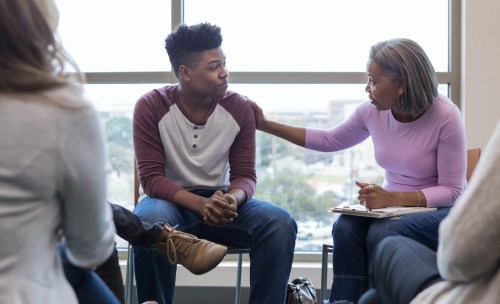In popular culture, eating disorder storylines usually go the same way: A thin white girl skips meals and loses weight. Her parents get worried. They send her to a therapist or treatment center, and she gets better. But eating disorders—and recovery—are so much more complicated. People of any identity can have an eating disorder, potential harms of treatment centers aren’t shown, and the power of community care is often ignored.
Experts in This Article
Dr. Jennie Wang-Hall is a psychologist and eating disorder justice advocate.
Mimi Cole is an eating disorder survivor and therapist-in-training at the University of North Carolina.
Let’s be clear: Traditional therapy and treatment centers are instrumental, and it’s clear that recovery isn’t typically managed alone (or without trained professionals). However, treatment centers are not a panacea. It’s not uncommon for people to share negative experiences at in-patient centers, including transphobia, shame, and in some cases, post-traumatic stress disorder (PTSD).
Moreover, treatment centers don’t always reflect the recovery process. Recovery can take years, and facilities can’t always prepare patients for life after in-patient treatment. However, community care can fill in some of the gaps. Besides being financially accessible, community care supports people long-term and empowers survivors throughout recovery—and it involves entire communities, including allies.
“Community care is a crucial component of recovery in that it actively counters the shame and self-invalidation that are core tenets of having an eating disorder,” says Jennie Wang-Hall, PhD, a psychologist and eating disorder justice advocate. “We, as a field, need to move away from individualistic hyper-responsibilization and towards a more systemic and justice-oriented understanding of how and why people struggle with food and [their] body.”
Here’s how community care supports eating disorder recovery
Educational training for allies
Some organizations offer training sessions that help reduce the stigma and shame associated with eating disorders. Usually, this entails information on eating disorder signs and how to support someone at each stage of recovery. Many trainings also address how eating disorders aren’t just a “thin white girl’s disease,” but something that people of any size, race, gender, socioeconomic status, or age can (and do) experience.
Embody Carolina is an organization that hosts virtual, social justice-based eating disorder trainings, and the National Center of Excellence for Eating Disorders (NCEED) has online educational resources and videos. You can also contact local mental health chapters, such as the National Alliance on Mental Illness (NAMI) to give a presentation.
Educated allies are essential. Yes, doctors have their roles, but so do loved ones. Family and friends can step in when parents aren’t there or are abusive. They can spend meaningful time with you, attend provider appointments as emotional support, model healthy eating, and so much more.
Meal support
“Meal support typically entails the facilitator engaging in normal eating and serving as a model in this way. It also can be a great opportunity for clients to connect with each other and receive support,” Dr. Wang-Hall says.
Allies and friends can also engage in meal support. For example, if it’s hard for someone to eat without relying on disordered eating behaviors, a friend or ally can eat with that person and stay with them after the meal. They can go to new restaurants together, eat meals over FaceTime, or just serve as emotional support by being there. “Meal support options can be very helpful as they can bring a sense of safety and comfort into a time that might be very anxiety-provoking,” Dr. Wang-Hall explains.
Identity-specific support groups
Eating disorder recovery is further complicated by size, racial, and gender biases. People who don’t fit the arbitrary eating disorder “mold” often don’t get treatment, a study shows. They face extra barriers because the public doesn’t tend to believe they can have eating disorders (and individuals with EDs may not even believe it themselves).
Identify-specific support groups can help. For example, the National Alliance for Eating Disorders has an LGBTQIA+ support group where participants talk about the specific issues and triggers they face. The National Association of Anorexia Nervosa and Associated Disorders (ANAD) has multiple affinity groups for BIPOC survivors, people in larger bodies, and people who are older. “Integrating community care allows space for learning skills, like distress tolerance and practicing reducing morality around numbers,” says Mimi Cole, an eating disorder survivor and therapist-in-training at the University of North Carolina.
Donating to people in recovery
It’s not uncommon to see people living with eating disorders on social media sharing their need for money for therapy, groceries, gender-affirming surgeries, or something else related to their bodies. Community care can also involve donating to them—more so than organizations, especially—if you’re in a place to do so. This can help survivors feel safer in their bodies and able to do what they need to do to recover.
Community care helps change how we view (and treat) eating disorders
Ultimately, community care is about making the world a healthier place for us all. “It is critical that we are all collectively learning more about the harms of diet culture and our language about our bodies because it is essential that the community is a safe place for individuals with eating disorders to heal,” Cole says. “It is critical that we challenge the status quo of recommendations we make to clients and phrases we repeat because that is what we have been taught, such as the practice of sending people off to higher levels of care without considering the possible traumatic experiences often experienced.”
Dr. Wang-Hall says providers need to take action to change, too. “We need to be fostering connection between folks struggling with eating disorders and empowering their voices above and beyond our own,” she says. “In my practice, this means offering low-cost and free group support as well as offering free meal support…I view myself as a facilitator of individuals connecting to understand their own wisdom and ability to recover.”
Oh hi! You look like someone who loves free workouts, discounts for cutting-edge wellness brands, and exclusive Well+Good content. Sign up for Well+, our online community of wellness insiders, and unlock your rewards instantly.
Sign Up for Our Daily Newsletter
Get all the latest in wellness, trends, food, fitness, beauty, and more delivered right to your inbox.
Got it, you've been added to our email list.











